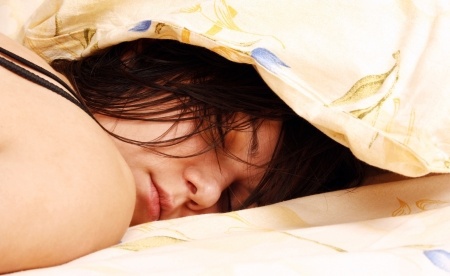Are Sex Dreams Related To Your Sleep Position?
November 25, 2013 by Justin Lehmiller

Erotic dreams are common. In fact, research has found that as many as 93% of men and 86% of women report having had them before [1]. Some people dream about sex a lot more than others, though. Indeed, for some folks, such dreams are a pretty regular occurrence, whereas for others, they are pretty rare. Why is that? A new study suggests that one’s likelihood of having sex dreams may be a function of the position in which that person usually sleeps [2].
In this study, researchers surveyed 670 college students (34% male, 66% female) in Hong Kong. Participants were asked about the frequency and intensity of various types of dreams. They were also asked to report how often they sleep on their front, back, and side.
Most participants (71%) reported having one dominant sleeping position. Of them, 72% reported sleeping primarily on their sides, 23% on their backs, and 5% on their stomachs. Sleeping mostly on one’s back or side was not linked to reports of erotic dreams; however, sleeping on one’s stomach was. Specifically, the more frequently people slept on their stomachs, the more likely they were to report dreaming about sexual experiences and being nude. Incidentally, sleeping on one’s stomach was also linked to dreams of being locked up or tied up, being smothered, and seeing UFOs. Hmm…this makes me wonder whether all of those people who report having been abducted and probed by aliens are stomach sleepers.
So why is sleeping face down linked to sex dreams? Given that this is a correlational study, we can’t say for sure; however, the authors theorize that the physical pressure this position creates on the genitals is being transferred into people’s dreams, leading them to become more erotic in nature. By the same token, the authors also theorize that because sleeping on one’s stomach has a tendency to create breathing difficulties and puts pressure on this chest, these sensations can be converted to dreams about being confined or suffocated.
To be clear, these findings don’t tell us definitively whether we can give ourselves more sex dreams by changing up the way we sleep. We would need some experimental evidence to confirm that. At the very least, these findings suggest the provocative possibility that the way we sleep may change the way we dream.
Want to learn more about The Psychology of Human Sexuality? Click here for a complete list of articles or like the Facebook page to get articles delivered to your newsfeed.
[1] Schredl, M., Ciric, P., GÖtz, S., & Wittmann, L. (2004). Typical dreams: stability and gender differences. The Journal of Psychology, 138, 485-494.
[2] Yu, C.K.C. (2012). The effect of sleep position on dream experiences. Dreaming, 22, 212-221.
Image Source: 123RF.com
You Might Also Like:

Dr. Justin Lehmiller
Founder & Owner of Sex and PsychologyDr. Justin Lehmiller is a social psychologist and Research Fellow at The Kinsey Institute. He runs the Sex and Psychology blog and podcast and is author of the popular book Tell Me What You Want. Dr. Lehmiller is an award-winning educator, and a prolific researcher who has published more than 50 academic works.
Read full bio >

